The advanced airport technologies market is expected to grow from USD 37.7 billion in 2025 to USD 55.8 billion by 2035, registering a 4.0% CAGR and generating an absolute dollar opportunity of USD 18.1 billion. Growth is driven by increasing air traffic, modernization of airport infrastructure, and the adoption of technologies such as automated baggage handling, biometric passenger processing, advanced security systems, and smart airport solutions. Investments in digitalization and efficiency improvements further support market expansion across developed and emerging regions. Acceleration and deceleration patterns highlight changes in market momentum throughout the forecast period.
From 2025 to 2028, early acceleration is moderate, with growth supported primarily by North America and Europe, where infrastructure upgrades, regulatory compliance, and pilot implementations drive incremental adoption. Between 2029 and 2032, acceleration increases as Asia Pacific, the Middle East, and Latin America expand airport capacity to accommodate rising passenger volumes, large-scale modernization projects, and integration of smart technologies. From 2033 to 2035, growth decelerates slightly as major airports reach higher penetration levels, and incremental revenue shifts toward replacement, upgrades, and optimization rather than new installations. Overall, the USD 18.1 billion opportunity reflects a market trajectory marked by early steady adoption, mid-decade rapid acceleration, and late-stage stabilization, demonstrating how advanced airport technologies continue to scale globally between 2025 and 2035.
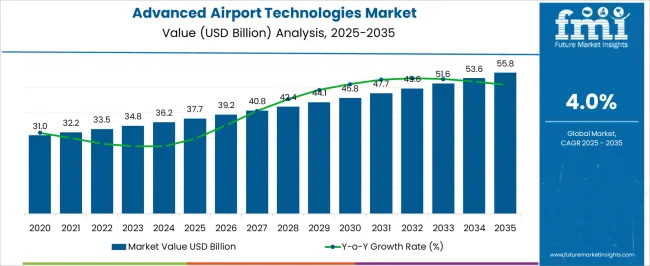
| Metric | Value |
|---|---|
| Advanced Airport Technologies Market Estimated Value in (2025 E) | USD 37.7 billion |
| Advanced Airport Technologies Market Forecast Value in (2035 F) | USD 55.8 billion |
| Forecast CAGR (2025 to 2035) | 4.0% |
The advanced airport technologies market is primarily driven by the airport operations and management sector, which accounts for around 45% of the market share, as airports implement automation, security, and operational efficiency solutions. The airline industry contributes approximately 25%, leveraging advanced technologies for flight scheduling, passenger processing, and baggage handling. Ground support and logistics services represent close to 15%, using technology for fleet management, cargo tracking, and operational coordination. The security and surveillance segment accounts for roughly 10%, integrating biometric systems, AI-based monitoring, and access control solutions. The remaining 5% comes from retail, hospitality, and passenger experience services within airports, adopting technologies to enhance engagement and convenience. The advanced airport technologies market is evolving with innovations in automation, AI, and IoT integration. Self-service kiosks, biometric identification, and facial recognition systems are being widely deployed to streamline passenger check-in and security processes. Smart baggage tracking and AI-based predictive maintenance are improving operational efficiency. Energy-efficient systems and intelligent lighting are enhancing sustainability. Cloud-based airport management platforms allow real-time data analysis and optimized decision-making. Partnerships between technology providers, airport authorities, and airlines are expanding deployment of integrated solutions. Growing passenger traffic, security requirements, and demand for seamless travel experiences continue to drive adoption of advanced airport technologies globally.
The Advanced Airport Technologies market is experiencing robust growth, driven by increasing investments in airport modernization and digital infrastructure. The current market is characterized by the integration of intelligent systems that enhance operational efficiency, passenger safety, and real-time data management. Advancements in automation, artificial intelligence, and Internet of Things technologies are enabling airports to optimize baggage handling, security screening, and traffic flow management.
Rising passenger volumes and the expansion of air travel networks are creating demand for scalable and flexible airport technology solutions. Governments and private airport operators are prioritizing the deployment of systems that can reduce operational bottlenecks and enhance security without disrupting passenger experience.
The market outlook remains positive as technological innovation continues to enable predictive maintenance, remote monitoring, and seamless integration with broader transportation networks Growing emphasis on sustainability and energy-efficient operations further supports the adoption of advanced airport technologies, positioning the market for continued expansion over the next decade.
The advanced airport technologies market is segmented by technology type, airport, and geographic regions. By technology type, advanced airport technologies market is divided into Airport Security Technologies, Airport Communication Technologies, Airport Management Software, Biometrics and Identity Management, Baggage Handling Systems, Air Traffic Management (ATM) Systems, Smart Airport Solutions, Passenger Experience Technologies, Airport Collaborative Decision Making (A-CDM), and Advanced Runway and Taxiway Technologies. In terms of airport, advanced airport technologies market is classified into International Airports, Domestic Airports, Cargo Airports, and Military Airports. Regionally, the advanced airport technologies industry is classified into North America, Latin America, Western Europe, Eastern Europe, Balkan & Baltic Countries, Russia & Belarus, Central Asia, East Asia, South Asia & Pacific, and the Middle East & Africa.
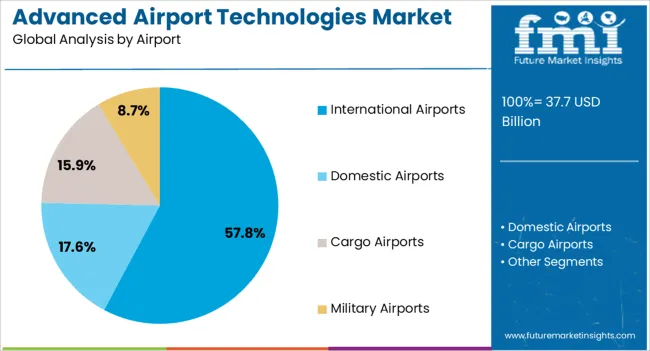
Airport Security Technologies are projected to hold 44.6% of the Advanced Airport Technologies market revenue in 2025, establishing them as the leading technology type. The growth of this segment has been driven by the increasing need to enhance passenger safety, manage security threats, and comply with stringent international regulations.
Adoption has been encouraged by the development of integrated systems that allow real-time monitoring, automated threat detection, and streamlined passenger screening processes. Investments in AI-enabled surveillance, biometric authentication, and advanced scanning equipment have reinforced the segment’s expansion, as these technologies offer improved accuracy and operational efficiency.
The emphasis on proactive risk management and incident prevention has led airports to prioritize security technologies that are adaptable, scalable, and capable of integrating with existing infrastructure Additionally, the ability to upgrade and enhance these systems through software without major hardware replacement has accelerated their adoption, making airport security technologies a cornerstone of advanced airport operations.
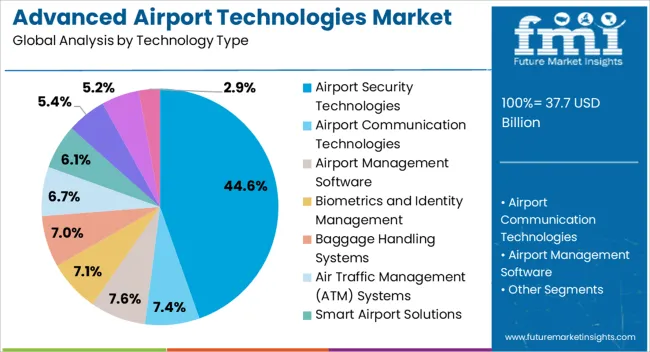
The International Airports end-use segment is expected to account for 57.8% of the Advanced Airport Technologies market revenue in 2025, positioning it as the largest consumer segment. Growth in this segment is being fueled by the high passenger traffic, complex operational requirements, and regulatory expectations typical of international airports.
The adoption of advanced airport technologies in these facilities has been encouraged by the need to manage security efficiently, optimize passenger flow, and ensure seamless check-in, boarding, and baggage handling processes. Investments in smart surveillance systems, automated baggage solutions, and AI-powered operational management have contributed to segment leadership.
The flexibility to upgrade systems through software updates, along with the integration of data-driven analytics for performance monitoring, has enhanced the operational effectiveness of international airports Additionally, the focus on improving passenger experience while maintaining safety standards has reinforced the preference for scalable, intelligent solutions in this segment, supporting its dominant position in the market.
The advanced airport technologies market is expanding due to increasing airport modernization programs, automation adoption, and demand for enhanced passenger experience. Asia Pacific leads with 35% adoption, driven by China (15%), Japan (10%), and India (10%). Europe accounts for 32%, led by Germany (10%), France (9%), and UK (13%). North America contributes 28%, primarily the USA, while the rest of the world represents 5%. Key applications include baggage handling systems (30%), security screening (25%), air traffic management solutions (20%), passenger processing systems (15%), and airport analytics (10%). Rising demand for contactless solutions and IoT-enabled systems is driving adoption in major airports globally.
Market growth is fueled by airport modernization initiatives, regulatory requirements, and technological advancements. Baggage handling systems account for 30% of installations, security screening 25%, air traffic management 20%, passenger processing 15%, and analytics 10%. Asia Pacific adoption stands at 35%, Europe 32%, North America 28%, and RoW 5%. Increasing passenger traffic and airline demand for operational efficiency are pushing airports to adopt automation and intelligent systems. IoT-enabled sensors and AI-based predictive maintenance are enhancing performance, while government funding and infrastructure investment in major regions such as China, USA, Germany, and Japan accelerate adoption.
Key trends include AI-driven security, biometrics, and smart airport analytics. AI-based surveillance is adopted in 25–30% of airports in Europe and North America. Biometric passenger processing is gaining traction, currently representing 20% of deployment in Asia Pacific and Europe. IoT-connected baggage and predictive analytics solutions account for 15–20% of adoption, improving operational efficiency and reducing delays. Automation in check-in, boarding, and baggage handling is increasingly standard. Smart energy management, predictive maintenance, and real-time operational dashboards are emerging trends that enhance airport efficiency and passenger satisfaction across global airports.
Opportunities exist in baggage handling, security, passenger processing, air traffic management, and airport analytics. Baggage systems hold 30% adoption, security screening 25%, air traffic management 20%, passenger processing 15%, and analytics 10%. Asia Pacific contributes 35%, Europe 32%, and North America 28%. Contactless and biometric solutions are expanding rapidly due to hygiene and security concerns. Expansion of smart airport projects in metropolitan regions creates opportunities for suppliers of automation, IoT, and AI-based systems. Integration with airline and passenger apps enhances operational efficiency. Investment in green and energy-efficient airport solutions is also opening new avenues for technology adoption globally.
Challenges include high implementation costs, system integration complexities, and regulatory compliance. Initial deployment costs are 20–25% higher than conventional systems, while ongoing maintenance adds an additional 10–15%. Compatibility issues between legacy airport systems and new automation platforms slow integration. Regional regulatory standards vary for security, passenger data, and air traffic management, increasing compliance costs. Workforce training for new technologies and cybersecurity requirements pose additional challenges. Small and regional airports face cost barriers, limiting adoption. Despite rapid modernization in major hubs, infrastructure and funding limitations constrain growth in less-developed regions such as Africa, Latin America, and parts of Southeast Asia.
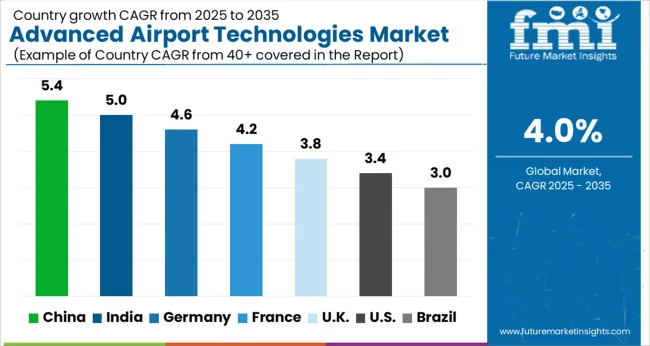
| Country | CAGR |
|---|---|
| China | 5.4% |
| India | 5.0% |
| Germany | 4.6% |
| France | 4.2% |
| UK | 3.8% |
| USa | 3.4% |
| Brazil | 3.0% |
The advanced airport technologies market is projected to grow at a global CAGR of 4% through 2035, driven by increasing demand for automation, security enhancements, and passenger experience improvements in airports worldwide. China leads at 5.4%, a 1.35× multiple over the global benchmark, supported by BRICS-driven airport modernization projects, expansion of international hubs, and adoption of smart airport technologies. India follows at 5.0%, a 1.25× multiple of the global rate, reflecting growing passenger traffic, government-backed infrastructure development, and upgrades in operational efficiency. Germany records 4.6%, a 1.15× multiple of the benchmark, shaped by OECD-backed innovation in airport systems, automated check-in, and security technologies. The United Kingdom posts 3.8%, 0.95× the global rate, with adoption focused on commercial airports, technology upgrades, and selective smart airport projects. The United States stands at 3.4%, 0.85× the benchmark, with steady uptake in domestic airport modernization, automation, and passenger service enhancements. BRICS economies drive volume growth, OECD nations emphasize technological advancement and operational efficiency, while ASEAN countries contribute through expanding airport infrastructure and modernization initiatives.
The advanced airport technologies market in China is projected to grow at a CAGR of 5.4%, driven by rapid airport expansion, modernization programs, and increasing passenger traffic. Domestic companies such as AVIC and China National Aero-Technology supply automated check-in systems, baggage handling solutions, and airport security technologies. Technological developments emphasize AI-enabled surveillance, biometric identification, and IoT-integrated operations. Growth is further fueled by government investments in smart airports, high-speed rail-airport integration, and international aviation hubs, enhancing operational efficiency and passenger experience.
The advanced airport technologies market in India is expected to grow at a CAGR of 5.0%, supported by modernization of domestic airports, rising passenger volumes, and government Smart Airport initiatives. Companies such as Larsen & Toubro and Honeywell provide automated baggage handling, digital check-in kiosks, and AI-driven security solutions. Technological adoption focuses on passenger flow management, automated screening, and energy-efficient operations. Expansion is also driven by private sector airport projects and international collaborations, improving overall operational standards and passenger experience.
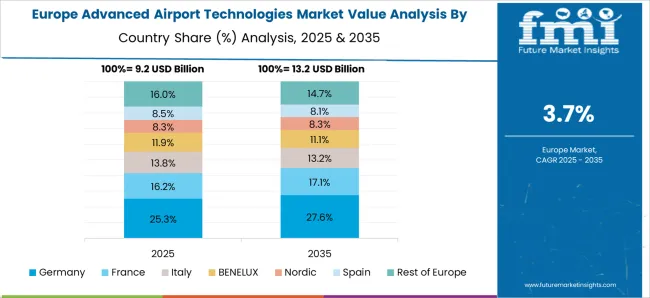
Germany’s advanced airport technologies market is projected to grow at a CAGR of 4.6%, influenced by airport modernization programs, high passenger traffic, and stringent security requirements. Suppliers such as Siemens and Fraport AG provide AI-enabled surveillance, automated baggage systems, and biometric boarding technologies. Adoption focuses on efficiency, security, and passenger convenience. Demand is concentrated in major international hubs such as Frankfurt and Munich, while regional airports are gradually upgrading to smart airport standards. Energy efficiency and automation technologies are key drivers of growth.
The advanced airport technologies market in the United Kingdom is expected to grow at a CAGR of 3.8%, driven by modernization of airports, expansion of security solutions, and increasing passenger traffic. Companies focus on automated check-in, biometric verification, and energy-efficient airport systems. Technological adoption is concentrated in major airports such as Heathrow, Gatwick, and Manchester, aiming to enhance operational efficiency and passenger satisfaction. Digital and AI-enabled solutions play a key role in streamlining airport operations while reducing congestion.
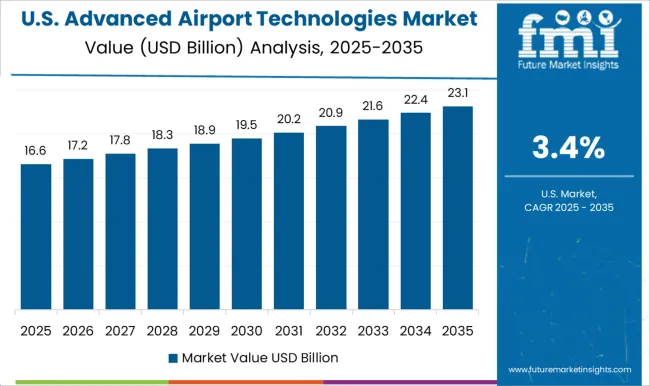
The advanced airport technologies market in the United States is projected to grow at a CAGR of 3.4%, supported by expansion and modernization of major international airports, increased passenger volumes, and integration of AI and automation. Leading suppliers such as Honeywell, Raytheon, and Johnson Controls provide advanced baggage handling, automated boarding, and biometric security solutions. Technological improvements emphasize operational efficiency, energy optimization, and real-time monitoring. Adoption is driven by major hubs including Atlanta, Dallas-Fort Worth, and Los Angeles, alongside secondary airports upgrading to meet evolving passenger expectations.
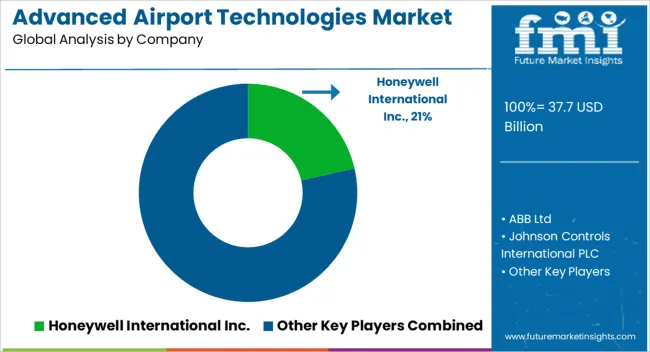
Competition in the advanced airport technologies market is being shaped by automation, safety, and operational efficiency for passenger processing, baggage handling, and security systems. Market positions are being reinforced through innovation in sensor technologies, software integration, and global deployment networks that ensure reliable airport operations. Honeywell International Inc. and ABB Ltd are being represented with integrated airport management systems engineered for real-time monitoring, predictive maintenance, and energy optimization. Johnson Controls International PLC and L3Harris Technologies Inc. are being promoted with automated solutions structured for security screening, environmental control, and operational analytics. Raytheon Technologies and Smith Detection Group Ltd are being applied with advanced security and detection systems optimized for threat identification, rapid response, and compliance with international aviation standards. Thales Group is being showcased with end-to-end airport technology solutions designed for baggage handling, passenger flow management, and digital communication networks. Strategies in the market are being centered on automation, system interoperability, and technological upgrades to enhance passenger experience and operational reliability. Research and development are being allocated to improve sensor accuracy, software intelligence, real-time data integration, and system resilience under high traffic conditions. Product brochures are being structured with specifications covering system capabilities, operational range, integration requirements, safety compliance, and maintenance procedures. Features such as automated processing, real-time monitoring, threat detection, and energy efficiency are being emphasized to guide procurement and deployment planning. Each brochure is being arranged to present technical performance, certification adherence, and service support. Information is being provided in a clear, evaluation-ready format to assist airport operators, technology integrators, and procurement teams in selecting advanced airport technologies that meet operational, safety, and efficiency requirements.
| Item | Value |
|---|---|
| Quantitative Units | USD 37.7 Billion |
| Technology Type | Airport Security Technologies, Airport Communication Technologies, Airport Management Software, Biometrics and Identity Management, Baggage Handling Systems, Air Traffic Management (ATM) Systems, Smart Airport Solutions, Passenger Experience Technologies, Airport Collaborative Decision Making (A-CDM), and Advanced Runway and Taxiway Technologies |
| Airport | International Airports, Domestic Airports, Cargo Airports, and Military Airports |
| Regions Covered | North America, Europe, Asia-Pacific, Latin America, Middle East & Africa |
| Country Covered | United States, Canada, Germany, France, United Kingdom, China, Japan, India, Brazil, South Africa |
| Key Companies Profiled | Honeywell International Inc., ABB Ltd, Johnson Controls International PLC, L3Harris Technologies Inc., Raytheon Technologies, Smith Detection Group Ltd, and Thales Group |
| Additional Attributes | Dollar sales by technology type and airport application, demand dynamics across passenger, cargo, and security operations, regional trends in airport modernization, innovation in automation, AI, and biometrics, environmental impact of energy use and electronic waste, and emerging use cases in smart airport management, passenger flow, and predictive maintenance. |
The global advanced airport technologies market is estimated to be valued at USD 37.7 billion in 2025.
The market size for the advanced airport technologies market is projected to reach USD 55.8 billion by 2035.
The advanced airport technologies market is expected to grow at a 4.0% CAGR between 2025 and 2035.
The key product types in advanced airport technologies market are airport security technologies, airport communication technologies, airport management software, biometrics and identity management, baggage handling systems, air traffic management (atm) systems, smart airport solutions, passenger experience technologies, airport collaborative decision making (a-cdm) and advanced runway and taxiway technologies.
In terms of airport, international airports segment to command 57.8% share in the advanced airport technologies market in 2025.






Our Research Products

The "Full Research Suite" delivers actionable market intel, deep dives on markets or technologies, so clients act faster, cut risk, and unlock growth.

The Leaderboard benchmarks and ranks top vendors, classifying them as Established Leaders, Leading Challengers, or Disruptors & Challengers.

Locates where complements amplify value and substitutes erode it, forecasting net impact by horizon

We deliver granular, decision-grade intel: market sizing, 5-year forecasts, pricing, adoption, usage, revenue, and operational KPIs—plus competitor tracking, regulation, and value chains—across 60 countries broadly.

Spot the shifts before they hit your P&L. We track inflection points, adoption curves, pricing moves, and ecosystem plays to show where demand is heading, why it is changing, and what to do next across high-growth markets and disruptive tech

Real-time reads of user behavior. We track shifting priorities, perceptions of today’s and next-gen services, and provider experience, then pace how fast tech moves from trial to adoption, blending buyer, consumer, and channel inputs with social signals (#WhySwitch, #UX).

Partner with our analyst team to build a custom report designed around your business priorities. From analysing market trends to assessing competitors or crafting bespoke datasets, we tailor insights to your needs.
Supplier Intelligence
Discovery & Profiling
Capacity & Footprint
Performance & Risk
Compliance & Governance
Commercial Readiness
Who Supplies Whom
Scorecards & Shortlists
Playbooks & Docs
Category Intelligence
Definition & Scope
Demand & Use Cases
Cost Drivers
Market Structure
Supply Chain Map
Trade & Policy
Operating Norms
Deliverables
Buyer Intelligence
Account Basics
Spend & Scope
Procurement Model
Vendor Requirements
Terms & Policies
Entry Strategy
Pain Points & Triggers
Outputs
Pricing Analysis
Benchmarks
Trends
Should-Cost
Indexation
Landed Cost
Commercial Terms
Deliverables
Brand Analysis
Positioning & Value Prop
Share & Presence
Customer Evidence
Go-to-Market
Digital & Reputation
Compliance & Trust
KPIs & Gaps
Outputs
Full Research Suite comprises of:
Market outlook & trends analysis
Interviews & case studies
Strategic recommendations
Vendor profiles & capabilities analysis
5-year forecasts
8 regions and 60+ country-level data splits
Market segment data splits
12 months of continuous data updates
DELIVERED AS:
PDF EXCEL ONLINE
Advanced Process Control Market Size and Share Forecast Outlook 2025 to 2035
Advanced Active Cleaning System for ADAS Market Forecast and Outlook 2025 to 2035
Advanced Driver Assistance System (ADAS) Testing Equipment Market Size and Share Forecast Outlook 2025 to 2035
Advanced Lead Acid Battery Market Size and Share Forecast Outlook 2025 to 2035
Advanced Energy Storage System Market Size and Share Forecast Outlook 2025 to 2035
Advanced Gear Shifter System Market Size and Share Forecast Outlook 2025 to 2035
Advanced Therapeutics Pharmaceutical Outsourcing Market Size and Share Forecast Outlook 2025 to 2035
Advanced Air Mobility Market Size and Share Forecast Outlook 2025 to 2035
Advanced Sensor Market Size and Share Forecast Outlook 2025 to 2035
Advanced Combat Helmet Market Size and Share Forecast Outlook 2025 to 2035
Advanced Optics Material Market Size and Share Forecast Outlook 2025 to 2035
Advanced Functional Materials Market Size and Share Forecast Outlook 2025 to 2035
Advanced Drill Data Management Solutions Market Size and Share Forecast Outlook 2025 to 2035
Advanced Water Management And Filtration Equipment Market Size and Share Forecast Outlook 2025 to 2035
Advanced Coating Market Size and Share Forecast Outlook 2025 to 2035
Advanced Aerospace Coatings Industry Analysis in Europe - Size, Share, and Forecast 2025 to 2035
Advanced Tires Market Size and Share Forecast Outlook 2025 to 2035
Advanced Therapy Medicinal Products Market Size and Share Forecast Outlook 2025 to 2035
Advanced Glass Market Size and Share Forecast Outlook 2025 to 2035
Advanced Server Energy Monitoring Tools Market Size and Share Forecast Outlook 2025 to 2035

Thank you!
You will receive an email from our Business Development Manager. Please be sure to check your SPAM/JUNK folder too.
Chat With
MaRIA